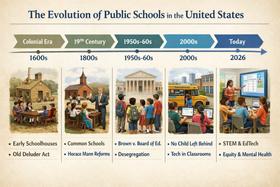Extensive research has shown that students achieve more in school when their parents are involved in their education. This article discusses the critical role moms and dads can play in a child's education. It also examines what the No Child Left Behind Act (NCLB) says about parental involvement and offers practical tips that parents can use to become involved.
Role of Parental Involvement in Education
The critical role of parental involvement in a child's education has been examined in countless studies and reports. The research overwhelmingly supports the following conclusions.
1. Academic achievement increases when parents are involved in their children's education.
The more intensively involved the parents are, the greater the positive impact on academic achievement.
2. Parental involvement leads to better classroom behavior.
Parental involvement not only enhances academic performance but it also has a positive influence on student attitude and behavior. A parent's interest and encouragement in a child's education can affect the child's attitude toward school, classroom conduct, self-esteem, absenteeism, and motivation.
3. Parents should stay involved in their children's education from preschool through high school.
Parental involvement can make a positive difference at all age levels. Parental involvement tends to be the greatest with young children and tends to taper off as children get older. Studies have shown, however, that the involvement of parents of middle and high school students is equally important. In high school, for example, a parent's encouragement can influence whether a child stays in school or drops out. Similarly, a child may consider going to college more seriously when parents show interest in the child's academic achievements and talk with the child about the benefits of a college education.
4. Training helps parents of disadvantaged children get involved.
Parents of minority or low-income children are less likely to be involved in their children's education than parents of non-disadvantaged children. If they receive adequate training and encouragement, however, parents of minority or low-income children can be just as effective as other parents in contributing to their children's academic success. As discussed below, one of the purposes of NCLB is to get parents of underachieving children involved in their education.
5. Reading together at home greatly improves reading skills.
Reading, in particular, improves greatly when parents and children read together at home. Reading aloud with a child contributes significantly to the child's reading abilities.
6. Schools can encourage parental involvement in many ways.
Significant parental involvement is most likely to develop when schools actively seek out ways to get parents involved and offer training programs to teach parents how to get involved in their children's education.
7. Parental involvement lifts teacher morale.
Schools and teachers benefit from parental involvement because involved parents develop a greater appreciation for the challenges that teachers face in the classroom. Teacher morale is improved. Communication between home and school helps a teacher to know a student better, allowing the teacher to teach the student more effectively. Communication also helps to dispel any mistrust or misperceptions that may exist between teachers and parents.
8. Parental involvement benefits children and parents.
By becoming involved in their children's education, moms and dads get the satisfaction of contributing to their children's education and future. They have a better understanding of the school curriculum and activities and can be more comfortable with the quality of education their child is receiving. They spend more time with their children and become able to communicate better with them. Some studies show that a parent's participation in a child's education may inspire the parent to further his or her own education.
9. Time constraints are the greatest barrier to parental involvement.
Lack of time is the top reason parents give for not participating more in their children's education. Lack of time is also cited by school personnel as a reason for not seeking parental support more actively. Thus, effective solutions to enhanced parent involvement require freeing up the time of parents and teachers or finding ways to work around their schedules.
Note: Project Appleseed, the National Campaign for Public School Improvement, initiated National Parental Involvement Day in 1994 and Public School Volunteer Week in 1997. The last National Parent Involvement Day was on November 15, 2007. The next Public School Volunteer Week is the third week of April 2008.
This CNN discussion illustrates why parental involvement in education matters.
NCLB on Parental Involvement
One of the purposes of NCLB is to encourage parents of disadvantaged or underachieving students to get involved in their children's education. This goal is accomplished by requiring the education system to reach out to parents by communicating effectively with them and by providing opportunities for parents to learn how to assist their children. Some of the more important initiatives for parental involvement under NCLB are discussed below. These programs apply to Title I schools, which under NCLB are schools with high numbers of disadvantaged students.
Schools must communicate effectively with parents.
NCLB stresses effective communication with parents and lists specific information that must be communicated. Schools are required to inform parents of their rights to be involved. Schools must notify parents about all school programs and report on their students' progress. Schools must describe and explain to parents the curriculum, the tests used to measure student progress, and the expected student proficiency levels. Communication required under NCLB goes much further than simply notifying parents by written announcements or reports. Parents with limited English proficiency must be accommodated, to the extent possible, with communication in a language that they understand. Schools may be required to provide transportation, child care, or home visits if necessary to reach out to parents and get them involved.
A school-parent pact demonstrates a commitment by schools and parents to improve students' academic performance.
NCLB emphasizes that schools and parents share responsibilities for improving academic achievement. Accordingly, each participating school is directed jointly to develop a school-parent pact with parents to articulate how they will help children meet the state academic standards. Under the pact, the school is responsible for providing a high-quality curriculum and instruction in a supportive and effective learning environment. Parents' responsibilities include supporting their children's learning by monitoring attendance, homework completion, and use of extracurricular time, volunteering in classrooms, and participating as appropriate in decisions pertaining to their children's education.
Schools take an active role in building capacity for parental involvement.
NCLB recognizes that some parents do not know how to participate in their children's education and that some schools do not know how to reach out to parents to get them involved. Thus, schools must educate teachers and other school personnel about reaching out to and working with parents as equal partners. For parents, schools are directed to offer materials and training to help parents work with their children, including literacy and technology. Schools also assist parents in understanding the state academic standards, monitoring a child's progress, and working with teachers to improve achievement.
This video explains how parental involvement contributes to positive results.
Tips for Being an Involved Parent
The following are some suggestions for moms and dads who wish to get involved or become more involved with their children's education. It is important to remember that doing even one thing on the list can make a difference in your child's academic progress.
- Read with your children and talk with them about the books and stories you read
- Help your children work on homework assignments
- Organize and monitor a child's time
- Tutor a child with materials and instructions provided by teachers (or found on the internet)
- Attend and actively support school activities
- Volunteer in classrooms, on field trips, or for special events
- Continue to be involved as your child is in middle and high school
- Attend parent-teacher meetings
- Talk with your child about school daily
- Be an advocate for your child to make sure that the child's needs are being met
- If a problem arises, address it quickly by requesting a meeting with the teacher
- Advise the teacher of any issues at home that may affect the child's school performance
- Vote in school board elections
- Encourage your children on successes and support them in poor performances
- Take classes at a community college or adult education program to demonstrate to the child that learning is important
- Participate in PTA or other parent organizations, school advisory councils, or committees
- If your child's school does not have a program for reaching out to parents, become an activist and persuade the school or school district about the importance of parental involvement
- Consider involving grandparents, who may be retired and have more time, in their grandchildren's education
The extent of Parental Involvement
While teachers and other school personnel agree that parental involvement leads to better achievement, there is some controversy about how far that parental involvement should extend. For example, most educators resist having parents involved in hiring teachers, paying teachers, and other personnel matters. Moreover, choosing textbooks and developing curricula are seen by teachers as requiring expertise that parents do not have. NCLB seems to recognize this sensitive issue by limiting the rights of parents to areas involving parent participation. For example, parental involvement policies must be developed jointly with schools and parents, parental feedback about the parental involvement policies is encouraged, and parents have a say in using the Parental Involvement Fund.
This video offers a look at the basics of parental involvement.
Conclusion
Parental involvement in a child's education is an advantage that money cannot buy. All parents, regardless of economic status, race, or primary language, can ask a child about school or attend a parent-teacher meeting. Being involved in your child's education not only helps your child to achieve more academically, but it also lifts teacher morale and provides you with the satisfaction of making a difference in your child's education.
Questions? Contact us on Facebook and Instagram. @publicschoolreview
#ParentalInvolvement #StudentSuccess #EducationPartnership #SchoolEngagement #FamilyLearning















